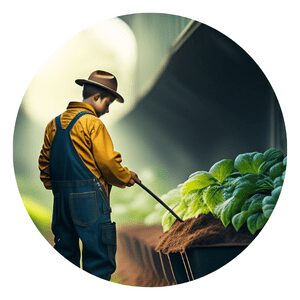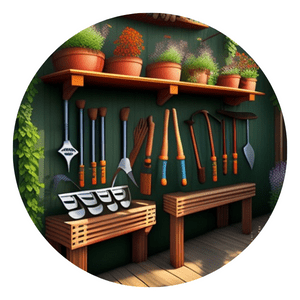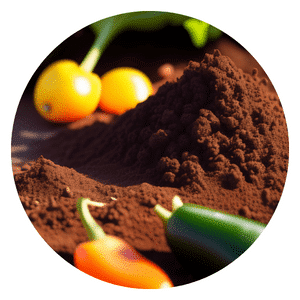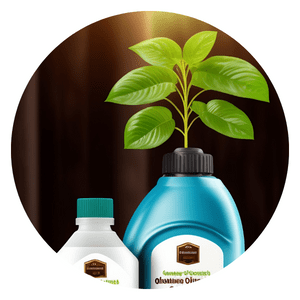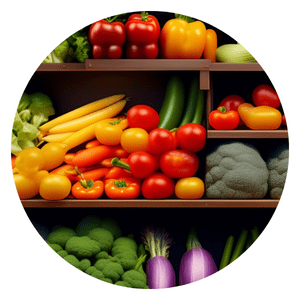Which Organic Fertilizer Is Best For Vegetable?
Are you tired of spending money on chemical fertilizers that harm the environment and produce lackluster results in your vegetable garden? It’s time to go organic!
Choosing the right organic fertilizer is crucial for ensuring healthy, nutrient-rich vegetables.
In this article, we’ll explore the various types of organic fertilizers available and help you determine which one is best suited for your specific vegetable needs.
Get ready to unleash the power of nature and take your vegetable garden to new heights!
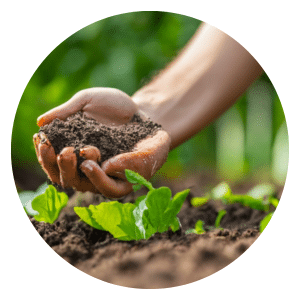
Organic Fertilizer For Vegetables
Organic Liquid Fish Fertilizer
Organic liquid fish fertilizer is a fantastic option when it comes to nourishing your vegetable garden. This high-quality fertilizer provides plants with an abundant supply of nutrients, which can significantly enhance their growth and productivity.
However, using the fertilizer correctly is key to maximizing its benefits.
To start, always follow the package instructions for dilution rates. Overusing or underusing the fertilizer can lead to adverse effects on your plants. Once properly diluted, you have two options for application: as a soil drench or as a foliar spray.
When applying as soil drench, pour the diluted fish fertilizer directly onto the soil around the base of your vegetable plants. This allows for easy absorption by the roots and ensures that all nutrients will be readily available to the plant.
Alternatively, foliar spraying involves applying a fine mist of diluted fish fertilizer directly onto the leaves of your vegetables. This method allows for quick absorption through the foliage, providing an immediate boost of nutrients.
Choosing when to use organic liquid fish fertilizer is just as important as how you use it. It’s best to apply this type of fertilizers during active growth periods such as early spring and mid-summer when your vegetables require an extra nutrient kick.
Additionally, consider applying after heavy rains or after watering thoroughly so that plants are more receptive to absorbing these beneficial nutrients.
Blood Meal
Blood meal is a fantastic organic fertilizer that can work wonders for your vegetable garden. It is a rich source of nitrogen, which is essential for promoting healthy leafy growth in plants.
When used early in the growing season, blood meal can provide an extra boost of nitrogen to support strong and vibrant foliage.
To use blood meal effectively, simply mix it into the soil before planting or sprinkle it around established plants. By incorporating this nutrient-rich fertilizer into the soil, you are ensuring that your vegetable plants have access to the vital nitrogen they need to thrive.
However, be careful not to overdo it with blood meal as excessive amounts can burn plant roots and damage vegetation.
One great advantage of using blood meal as an organic fertilizer is its slow-release nature.
Unlike synthetic fertilizers that release nutrients quickly but don’t sustain long-term fertility, blood meal provides a steady supply of nitrogen over time. This allows for consistent and balanced growth throughout the growing season.
Alfalfa Meal
Alfalfa meal, derived from the leafy tops of the alfalfa plant, is a nutritious organic fertilizer that can work wonders for your vegetable garden.
Its high nitrogen content promotes healthy plant growth and lush foliage, making it an excellent choice for leafy crops like lettuce and spinach.
Additionally, alfalfa meal helps improve soil structure by increasing its water-holding capacity and enhancing drainage.
Using alfalfa meal is simple. You can mix it directly into the soil before planting or spread it on top as a mulch throughout the growing season.
When applied as a top dressing, it slowly releases nutrients over time, providing a steady supply of nourishment to your plants without causing nutrient burn or excessive growth.
One unique benefit of using alfalfa meal is its ability to attract beneficial insects such as ladybugs and lacewings. These predators feed on common garden pests like aphids and caterpillars, helping to naturally control pest populations in your vegetable patch without relying on harmful chemicals.
To make the most of this organic fertilizer, consider using it in combination with other amendments such as compost or bone meal.
By utilizing different types of fertilizers in tandem, you can create a well-rounded nutrient profile that meets all the needs of your vegetables throughout their growing cycle.
In earth's loving embrace, alpaca's gift tends, To nurture life through cycles, where wonder transcends. Gather up droppings with care, as nature displays, Let time and elements work, in splendid arrays. Build layers of greens and browns, a symphony of sorts, Turn and aerate, watch transformation exhort. With patience and diligence, let nature's rhythms restore, The alpaca's gift transformed; compost to adore.
Chappy The Gardener
Goat Manure
Goat manure may sound unconventional, but it is a surprisingly effective organic fertilizer for vegetable gardens. However, caution must be exercised when using it to avoid burning your plants.
The best way to use goat manure is by composting or aging it before applying it to your soil. This process helps break down the high nitrogen content and prevents nutrient imbalances that could harm your plants.
Mixing goat manure into the soil benefits vegetables in multiple ways.
Firstly, it improves soil fertility by adding essential nutrients like nitrogen, phosphorous, and potassium.
Secondly, goat manure enhances soil structure by increasing its water-holding capacity and improving drainage. Additionally, incorporating this organic matter into the soil boosts its microbial activity, promoting a healthier environment for plant roots to thrive.
Timing is crucial when using goat manure as a fertilizer in your vegetable garden.
It’s best to apply the manure in the fall or early spring before planting begins. This allows enough time for the composted or aged goat manure to condition the soil fully and provide slow-release feedings throughout the growing season.
By timing its application right, you ensure that your vegetables receive a steady supply of nutrients without overwhelming them with excessive doses of nitrogen during active growth periods.
Rock Phosphate
Rock phosphate is a natural mineral source of phosphorus that can greatly benefit vegetable plants.
When using rock phosphate as a fertilizer, it is important to mix it into the soil before planting or apply it as a side dressing.
By doing this, you ensure that the phosphorus in rock phosphate is readily available for plant uptake.
The best time to use rock phosphate is before planting, as it provides a long-lasting source of phosphorus throughout the growing season. This is especially important for vegetable plants because they have high nutrient demands.
Rock phosphate slowly releases phosphorus over time, ensuring that your vegetables have access to this essential nutrient when they need it most.
In addition to providing phosphorus, rock phosphate also contains other beneficial minerals and trace elements like calcium and iron. These additional nutrients can improve soil health and contribute to overall plant growth.
Organic Kelp and Soluble Seaweed Fertilizer
Organic kelp and soluble seaweed fertilizer can be a fantastic addition to your vegetable garden. These natural fertilizers are derived from seaweed, which is rich in nutrients such as nitrogen, potassium, phosphorus, and trace minerals.
When used properly, they can provide numerous benefits to your plants.
To use organic kelp and soluble seaweed fertilizer, simply dilute the product according to the package instructions and apply it as a soil drench or foliar spray. This method ensures that the nutrients are readily available for plant uptake.
The application frequency will vary depending on the specific brand and plant needs but using them throughout the growing season is generally recommended.
The use of organic kelp and soluble seaweed fertilizer promotes healthy growth by nourishing your plants with essential nutrients. They also help improve soil structure, stimulate root development, enhance stress tolerance in plants, increase disease resistance, and even reduce transplant shock.
Alpaca Manure
Alpaca manure is a fantastic organic fertilizer that can greatly enhance soil fertility and texture.
However, it’s essential to compost or age the manure before using it on your vegetable garden to prevent any burning effects.
Composting allows the manure to break down and decompose, transforming it into a rich, nutrient-dense material ready for use.
Once your alpaca manure has aged or been composted properly, you can mix it into the soil of your vegetable garden. The high nutrient content in alpaca manure helps improve plant growth and overall productivity by providing essential nitrogen, phosphorus, and potassium.
Additionally, the organic matter in the manure enhances soil structure and water retention capacity.
When choosing when to use alpaca manure on your vegetables, aim for either spring or fall application.
Springtime application gives your plants a boost as they begin their growing season while fall application allows nutrients to slowly release over winter months so that they are readily available in early spring when new plants emerge from dormancy.
By strategically timing its usage throughout the year, you can ensure optimal results from this remarkable natural fertilizer.
Humus Compost Fish Manure
Not only does it provide vital nutrients for your plants, but it also improves soil health in the process.
The best part? It’s odorless, so you won’t have to worry about that unpleasant smell lingering around your garden.
To make the most of this amazing fertilizer, mix it into the soil before planting or use it as a top dressing around established plants.
When applied during the growing season, Fishnure helps replenish the nutrients that are essential for healthy plant growth. Its high nitrogen content promotes lush green foliage and encourages robust root development.
The benefits don’t stop there; Fishnure also enhances soil structure by increasing its water-holding capacity and promoting good drainage. This leads to better nutrient uptake by plants and reduces water stress during dry periods.
Additionally, its organic humus content improves soil fertility over time, making your garden more productive year after year.
Whether you’re an experienced gardener or just starting out with organic fertilizers, Fishnure Odorless Organic Humus Compost Fish Manure Fertilizer is a must-have in your arsenal.
By using this versatile product during the growing season, you’ll see noticeable improvements in both plant performance and overall soil health in no time.
In conclusion, when it comes to choosing the best organic fertilizer for vegetables, there are several options available.
Each type of fertilizer has its own set of advantages and disadvantages, so it is important to consider the specific needs of your vegetable garden.
Compost is a versatile and nutrient-rich option that can improve soil structure and fertility over time.
Manure provides essential nutrients and can be a cost-effective choice for larger gardens.
Fish emulsion is a fast-acting fertilizer that is rich in nitrogen, while seaweed-based fertilizers offer a wide range of trace minerals.
Ultimately, the best organic fertilizer for your vegetable garden will depend on factors such as your soil composition, budget, and personal preferences.
Experimenting with different types of fertilizers may be necessary to
Click To Grow
Helps Us Grow – Share If You Like


